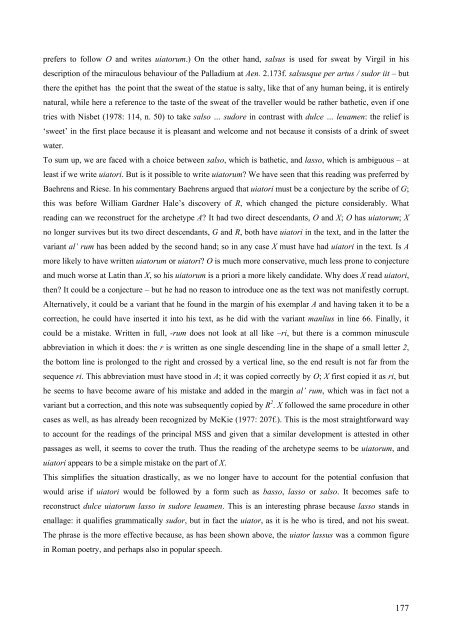CATULLUS 68 - Scuola Normale Superiore
CATULLUS 68 - Scuola Normale Superiore
CATULLUS 68 - Scuola Normale Superiore
Create successful ePaper yourself
Turn your PDF publications into a flip-book with our unique Google optimized e-Paper software.
prefers to follow O and writes uiatorum.) On the other hand, salsus is used for sweat by Virgil in his<br />
description of the miraculous behaviour of the Palladium at Aen. 2.173f. salsusque per artus / sudor iit – but<br />
there the epithet has the point that the sweat of the statue is salty, like that of any human being, it is entirely<br />
natural, while here a reference to the taste of the sweat of the traveller would be rather bathetic, even if one<br />
tries with Nisbet (1978: 114, n. 50) to take salso … sudore in contrast with dulce … leuamen: the relief is<br />
‘sweet’ in the first place because it is pleasant and welcome and not because it consists of a drink of sweet<br />
water.<br />
To sum up, we are faced with a choice between salso, which is bathetic, and lasso, which is ambiguous – at<br />
least if we write uiatori. But is it possible to write uiatorum? We have seen that this reading was preferred by<br />
Baehrens and Riese. In his commentary Baehrens argued that uiatori must be a conjecture by the scribe of G;<br />
this was before William Gardner Hale’s discovery of R, which changed the picture considerably. What<br />
reading can we reconstruct for the archetype A? It had two direct descendants, O and X; O has uiatorum; X<br />
no longer survives but its two direct descendants, G and R, both have uiatori in the text, and in the latter the<br />
variant al’ rum has been added by the second hand; so in any case X must have had uiatori in the text. Is A<br />
more likely to have written uiatorum or uiatori? O is much more conservative, much less prone to conjecture<br />
and much worse at Latin than X, so his uiatorum is a priori a more likely candidate. Why does X read uiatori,<br />
then? It could be a conjecture – but he had no reason to introduce one as the text was not manifestly corrupt.<br />
Alternatively, it could be a variant that he found in the margin of his exemplar A and having taken it to be a<br />
correction, he could have inserted it into his text, as he did with the variant manlius in line 66. Finally, it<br />
could be a mistake. Written in full, -rum does not look at all like –ri, but there is a common minuscule<br />
abbreviation in which it does: the r is written as one single descending line in the shape of a small letter 2,<br />
the bottom line is prolonged to the right and crossed by a vertical line, so the end result is not far from the<br />
sequence ri. This abbreviation must have stood in A; it was copied correctly by O; X first copied it as ri, but<br />
he seems to have become aware of his mistake and added in the margin al’ rum, which was in fact not a<br />
variant but a correction, and this note was subsequently copied by R 2 . X followed the same procedure in other<br />
cases as well, as has already been recognized by McKie (1977: 207f.). This is the most straightforward way<br />
to account for the readings of the principal MSS and given that a similar development is attested in other<br />
passages as well, it seems to cover the truth. Thus the reading of the archetype seems to be uiatorum, and<br />
uiatori appears to be a simple mistake on the part of X.<br />
This simplifies the situation drastically, as we no longer have to account for the potential confusion that<br />
would arise if uiatori would be followed by a form such as basso, lasso or salso. It becomes safe to<br />
reconstruct dulce uiatorum lasso in sudore leuamen. This is an interesting phrase because lasso stands in<br />
enallage: it qualifies grammatically sudor, but in fact the uiator, as it is he who is tired, and not his sweat.<br />
The phrase is the more effective because, as has been shown above, the uiator lassus was a common figure<br />
in Roman poetry, and perhaps also in popular speech.<br />
177






